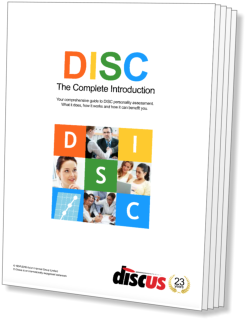III. The Four Factors
The results of a DISC questionnaire are usually presented in the form of a DISC Graph (or a set of graphs, known as a Profile Series). This chapter looks at the different types of DISC graphs available, the four DISC factors (Dominance, Influence, Steadiness and Compliance) and the twelve standard 'sub-traits' that are derived from these four factors.
From Style Card to DISC Graph
This section explains the relationship of the 'Biaxial Model' and the Style Card to the standard DISC Graph. You will find this particularly helpful if you have read through chapters I and II and are interested in the direct connections between the underlying theory and the DISC profile itself.
Principles of DISC Profiling
In order to produce a set of DISC results, it is of course necessary to objectively assess an individual's behavioural style. The range of techniques available for achieving this are growing and diversifying, but there are certain principles that remain standard in any DISC questionnaire. This section examines these underlying ideas.
The Basics of DISC Graphs
Most DISC profiling systems provide three standard DISC profiles, each of which goes by various names. This section explains the meanings of these three profiles, and their relationships to one another.
D for Dominance
The first of the four DISC factors is Dominance, abbreviated to D. This section gives a description of the Dominance factor.
I for Influence
Influence (abbreviated to I) is the second of the four factors. In this section, we discuss the main elements of the Influence factor.
S for Steadiness
Steadiness (S) is the third factor. The traits and behaviour of the Steady style are explained in this section.
C for Compliance
The fourth and final DISC factor is Compliance, or simply C. The Compliance factor is described in this section.
Changes Across a Series
It is not unusual to find variations across the three graphs within a DISC profile series. In this section, we look at the significance of different shifts, and the ways that these can help interpretation.
Twelve Standard Sub-traits
From combinations of the four basic DISC factors, it is possible to extract twelve further factors, called sub-traits. This section looks at these twelve sub-traits, their definitions, and their meanings.
Job Matching
Job Matching is a useful technique for quickly assessing an individual's suitability for a particular role, achieved by matching a pre-defined Job Profile or Template with a DISC profile. This section looks briefly at the theory and practice of this technique.
Stress
While DISC was not explicitly designed to measure stress, it is often possible to use a profile series to derive a general picture of an individual's stress levels, and their likely sources. This section takes a look at DISC's uses with regard to stress.

